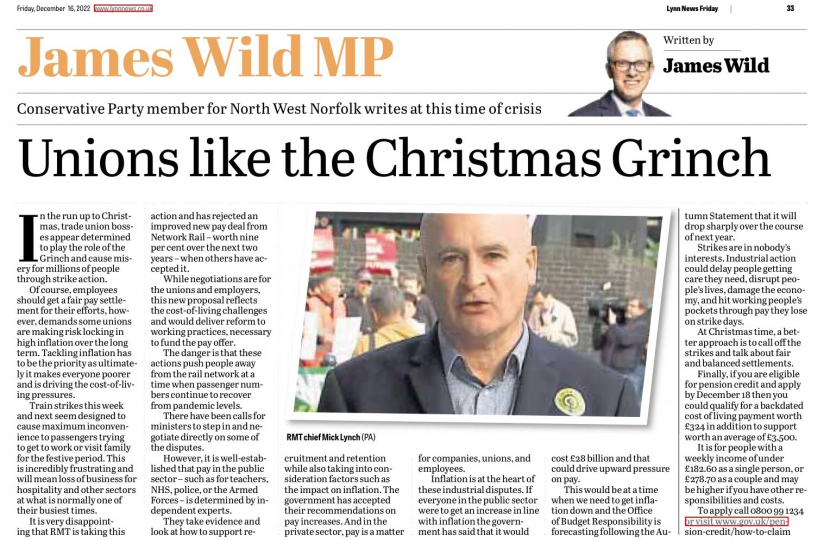
James writes about industrial action and urges unions to call off damaging strike action.
In the run up to Christmas, trade union bosses appear determined to play the role of the Grinch and cause misery for millions of people through strike action. Of course, employees should get a fair pay settlement for their efforts, however, demands some unions are making risk locking in high inflation over the long term. Tackling inflation has to be the priority as ultimately it makes everyone poorer and is driving the cost-of-living pressures.
Train strikes this week and next seem designed to cause maximum inconvenience to passengers trying to get to work or visit family for the festive period. This is incredibly frustrating and will mean loss of business for hospitality and other sectors at what is normally one of their busiest times. It is very disappointing that RMT is taking this action and has rejected an improved new pay deal from Network Rail – worth nine per cent over the next two years – when others have accepted it. While negotiations are for the unions and employers, this new proposal reflects the cost-of-living challenges and would deliver reform to working practices, necessary to fund the pay offer. The danger is that these actions push people away from the rail network at a time when passenger numbers continue to recover from pandemic levels.
There have been calls for ministers to step in and negotiate directly on some of the disputes. However, it is well-established that pay in the public sector - such as for teachers, NHS, police, or the Armed Forces - is determined by independent experts. They take evidence and look at how to support recruitment and retention while also taking into consideration factors such as the impact on inflation. The government has accepted their recommendations on pay increases. And in the private sector, pay is a matter for companies, unions, and employees.
Inflation is at the heart of these industrial disputes. If everyone in the public sector were to get an increase in line with inflation the government has said that it would cost £28 billion and that could drive upward pressure on pay. This would be at a time when we need to get inflation down and the Office of Budget Responsibility is forecasting following the Autumn Statement that it will drop sharply over the course of next year.
Strikes are in nobody’s interests. Industrial action could delay people getting care they need, disrupt people’s lives, damage the economy, and hit working people’s pockets through pay they lose on strike days. At Christmas time, a better approach is to call off the strikes and talk about fair and balanced settlements.
Finally, if you are eligible for pension credit and apply by 18 December then you could qualify for a backdated cost of living payment worth £324 in addition to support worth an average of £3,500. It is for people with a weekly income of under £182.60 as a single person, or £278.70 as a couple and may be higher if you have other responsibilities and costs. To apply call 0800 99 1234 or visit www.gov.uk/pension-credit/how-to-claim
This article was first published in the Lynn News on 16 December 2022.

